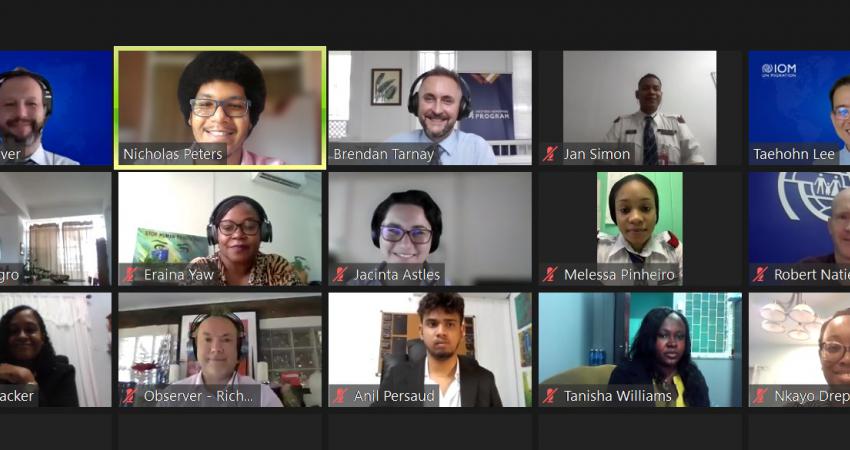IOM delivers Training on Essentials of Migration Management to Government Officials

The International Organization for Migration (IOM) began its ten-day workshop on the IOM Essentials of Migration Management 2.0 (EMM2.0) to Guyana government officials across several key stakeholder sectors. This workshop is hosted online in collaboration with the Ministry of Foreign Affairs and International Cooperation.
The EMM2.0 is a global programme on migration management which provides online resources and foundational training to government officials and stakeholders dealing with migration. This training is made possible through IOM’s Western Hemisphere Program (WHP), generously funded by the United States Department of State Bureau of Population, Refugees and Migration (PRM).
The EMM2.0 training workshop is designed to lend support to Governments that are committed to incorporating a migration framework into their national development plans.
“Well-managed migration promotes economic growth and social enrichment in countries of origin, transit and destination. For the migrants, it offers broader horizons, and the opportunity to work towards a better future,” explained IOM Regional Director for Central and North America and the Caribbean, Michele Klein Solomon.
As one of the designers of the original EMM course, Solomon noted that the initiative does not aim to prescribe a “one-size-fits-all” approach to how countries implement migration management mechanisms. Instead, the course offers institutional guidance based on good practices.
“The initiative offers accurate and up-to-date information, with an aim to contribute to a common understanding of migration management, grounded in international frameworks, such as the 2030 Agenda for Sustainable Development and the Global Compact for Safe, Orderly and Regular Migration,” added Solomon.
Furthermore, it was noted by both IOM and the Government that there is a need to establish a balance between national interests and agreed upon-international commitments as they relate to migration governance. This training will contribute to crafting national responses to thematic areas in migration governance such as border management, labour migration, or migrant integration strategies. These responses would be dependent on the experience and guidance provided by those government officials participating in the training.
Migration is a multi-faceted phenomenon with linkages to other sectors of society. Solomon noted that several factors, such as the lack of legal pathways, conflict, and extreme poverty, can contribute to irregular movement across borders and leaves migrants vulnerable to smuggling and trafficking groups. Moreover, the Regional Director explained that COVID-19 has called for inter-regional adjustments for border management systems and health procedures. These factors, along with country specific components, will be incorporated in the training over its duration.
Senior Ambassador Michael Brotherson, Director of Bilateral Affairs, within the Ministry Foreign Affairs and International Cooperation of Guyana welcomed the initiative as step in the right direction for addressing the migration dynamics in the country. He noted that this will provide government officials with the opportunity to increase their capacity to address migration management challenges and shape policies that will address this issue in the country’s new development phase.
